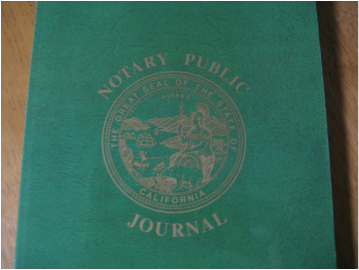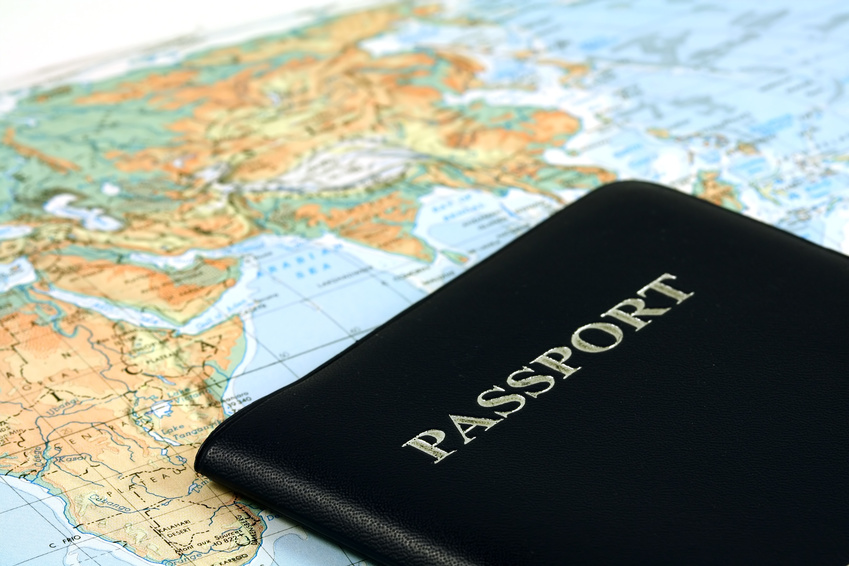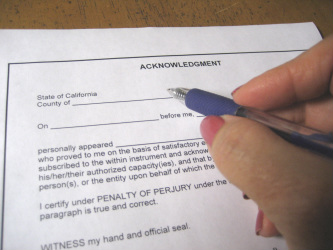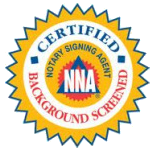Frequently Asked Questions
This information is provided as a courtesy and should not be construed as legal advice.
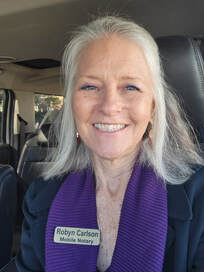
1. What is a Notary Public?
A Notary Public is a public official appointed by the California Secretary of State to be an impartial witness in the signing of important documents and to administer oaths and affirmations.
Each Notary Public must pass both an examination given by the State and a background check.
Beginning in 2005, notaries were also required to complete six hours of training before receiving their commission, and renewing notaries must complete three hours of training.
Unless a licensed attorney, a Notary Public may not give legal advice, draft legal documents nor accept fees for legal advice.
A Notary may not even advise a client as to the type of notarization a document requires. The correct notarial wording must be provided by the creator of the document to be notarized.
A Notary Public is a public official appointed by the California Secretary of State to be an impartial witness in the signing of important documents and to administer oaths and affirmations.
Each Notary Public must pass both an examination given by the State and a background check.
Beginning in 2005, notaries were also required to complete six hours of training before receiving their commission, and renewing notaries must complete three hours of training.
Unless a licensed attorney, a Notary Public may not give legal advice, draft legal documents nor accept fees for legal advice.
A Notary may not even advise a client as to the type of notarization a document requires. The correct notarial wording must be provided by the creator of the document to be notarized.
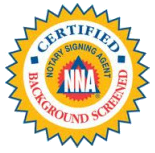
2. What is a Certified Notary Signing Agent?
A Certified Notary Signing Agent is a Notary Public with experience in conducting real estate or mortgage loan signings.
There are multiple documents involved in any real estate transaction, sometimes as many as 7 separate documents.
The Notary Signing Agent ensures that all the documents have been prepared properly. Ideally, they will explain what each document is so that you understand it before you sign it.
They make sure that you sign every document in all the places where a signature is required.
A professional and efficient Notary Signing Agent will make sure that the loan signing package is done right, the first time, so that it doesn't get returned and have to be redone and resubmitted.
A Certified Signing Agent has passed an examination administered by an industry-recognized entity such as the National Notary Association.
However, there are no federal, state, or local statutes that designate what "certification" requires or means.
Notaries go through the certification process voluntarily to demonstrate their knowledge and professionalism.
A Certified Notary Signing Agent is a Notary Public with experience in conducting real estate or mortgage loan signings.
There are multiple documents involved in any real estate transaction, sometimes as many as 7 separate documents.
The Notary Signing Agent ensures that all the documents have been prepared properly. Ideally, they will explain what each document is so that you understand it before you sign it.
They make sure that you sign every document in all the places where a signature is required.
A professional and efficient Notary Signing Agent will make sure that the loan signing package is done right, the first time, so that it doesn't get returned and have to be redone and resubmitted.
A Certified Signing Agent has passed an examination administered by an industry-recognized entity such as the National Notary Association.
However, there are no federal, state, or local statutes that designate what "certification" requires or means.
Notaries go through the certification process voluntarily to demonstrate their knowledge and professionalism.

3. Why do documents require notarization?
Notarization creates a public record and helps prevent fraud. Before notarizing a
document, the Notary Public will verify the identity of the signer(s) of a document, who:
Notarization creates a public record and helps prevent fraud. Before notarizing a
document, the Notary Public will verify the identity of the signer(s) of a document, who:
- personally appeared before the Notary on the date and in the County indicated and
- acknowledged signing (or executing) the document.
|
4. What types of documents are notarized?
Basically, any type of transaction or agreement where the interested parties want to ensure that the signer of the document is who they say they are and that the content of the document reflects the truth should be notarized. |
Many types of documents are notarized:
|
5. What type of identification will I need to show the Notary?
Whatever form of ID you use, it must:
Whatever form of ID you use, it must:
- be current or issued within the last 5 years
- have a photo of you
- have a physical description of you including height, weight, color of eyes
and color of hair - show your signature
- have an identifying number
- have the name on the ID matching the name on the document being
notarized
|
Examples of acceptable IDs are:
|
Without such a photo ID, satisfactory Evidence of Identity requires:
- either the oath or affirmation of a Credible Witness, who personally knows both the Signer and the Notary Public
- or the oath or affirmation of two Credible Witnesses, who personally know only the Signer.
Unacceptable forms of ID are:
- Social Security Cards
- Birth Certificates
- Credit Cards
- Temporary Driver's License
- An ID which has expired (unless issued within the last 5 years)
- Any ID on which the name does not match the name on the document being notarized
Acknowledgement - The purpose of an Acknowledgement is the positive identification of the document signer to ensure that the document has, in fact, been signed by that particular person.
Jurat - A Jurat is used to verify the identity of the signer(s) and to compel truthfulness by the document signer. The Notary will ask the signer(s) to swear under oath or affirmation that a statement made in the document is true.
Oaths or Affirmations - The Notary will ask the signer(s) to swear under oath or affirmation that a statement made in the document is true.
A Notary may not advise a client what type of notarization a document requires. The correct notarial wording must be provided by the creator of the document to be notarized.
In all notarizations, the document signer must be acting of his or her own free will and must be able to communicate that he or she understands what is being signed.
An interpreter can never be used to communicate between the signer and the Notary Public.
Jurat - A Jurat is used to verify the identity of the signer(s) and to compel truthfulness by the document signer. The Notary will ask the signer(s) to swear under oath or affirmation that a statement made in the document is true.
Oaths or Affirmations - The Notary will ask the signer(s) to swear under oath or affirmation that a statement made in the document is true.
A Notary may not advise a client what type of notarization a document requires. The correct notarial wording must be provided by the creator of the document to be notarized.
In all notarizations, the document signer must be acting of his or her own free will and must be able to communicate that he or she understands what is being signed.
An interpreter can never be used to communicate between the signer and the Notary Public.

